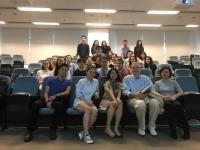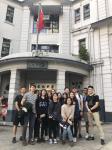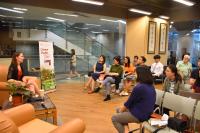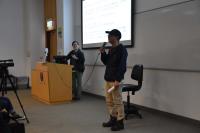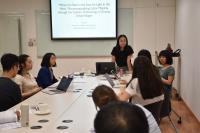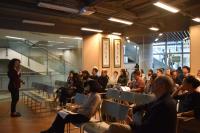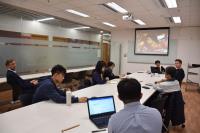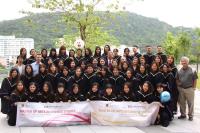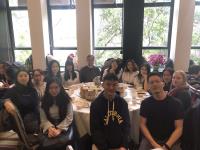CCS Visiting Speaker Series
Kicking off this term's series, Prof. Xiao Suowei (Beijing Normal University) on January 29 gave a talk with the title Desire and Dignity: Mistress-Keeping and the Ethics of Intimate Relationships in a Changing China. Based on a year-long field survey, including a certain number interviews, Prof. Xiao carefully depicted and analyzed the different implications of mistress-keeping for males of different social classes, as well as the different trajectories and experiences of local women and mobile female workers caught in such relationships. On March 12, Dr. Leta Hong Fincher, a journalist and scholar, gave a talk on her new book Betraying Big Brother: The Feminist Awakening in China. Her book focuses on the "Feminist Five" who were arrested by the Chinese government on the eve of International Women's Day in 2015 and jailed for thirty-seven days. Tracing the rise of a new feminist consciousness in China, Hong Fincher described how the movement against patriarchy could reconfigure the country and the world. Two weeks later, on March 25, Prof. Dorothy Wai Sim Lau (Hong Kong Baptist University) gave a talk on her book Chinese Stardom in Participatory Cyberculture. Based on one of the chapters of the book, this talk featured a case study of the celebrated Chinese female star, Zhang Ziyi. As Zhang became famous globally, her persona was dogged by scandals and put under public scrutiny. This talk discussed how the actress's "Chinese" image is refashioned and negotiated around cultural nationalism and, thus, unpacks the intricate relationship between fame, gender, and ethnicity in the interactive cyberspace. On April 9, Prof. Yang Zhan (Hong Kong Polytechnic University) gave a talk titled "When It's Dark in the East, It's Light in the West": Reconceptualizing Labor Mobility through the Culture of Venturing in Chinese Urban Villages. This talk explored the migrant culture of venturing and the cultural logic of labor mobility in the informal sector. Prof. Zhan discussed how since the neoliberal restructuration in the 1970s, the urban world has become increasingly unequal. Chinese rural migrants are pushed to the urban fringes and the informal sectors. In response, resistance and life strategies in the form of occupying/squatting have risen. Prof. Emily Wilcox (University of Michigan) gave the last talk of the term. On April 25, she shared with students and faculty findings from her recently published book Revolutionary Bodies: Chinese Dance and the Socialist Legacy. Based on ethnographic and archival research spanning over ten years, Prof. Wilcox showed that the contemporary practice of Chinese dance is the major creative project and primary legacy of the socialist era.
CCS China Research Colloquia
On January 25, Mr. Tang Sanjiao, a PhD candidate at the University of Auckland, shared his research on the daily life of the grassroots during the Cultural Revolution in a talk titled To Buy or Not to Buy—Study on the Luxury Consumption in Sichuan during the Cultural Revolution. With a focus on the Sichuan region, Mr. Tang argued that ordinary life during the era was not necessarily marked by hardship and poverty only. In fact, the purchase rate of luxury items such as wristwatches and radios continued to rise. Besides providing reasons for this unexpected phenomenon, Mr Tang's research also aims to provide another vantage point from which the multifaceted everyday life during the Revolution can be understood. On April 8, Hong Kong poet Lau Yi Ching (also known as Yam Gong) gave a lecture titled Bronze-like Salted Fish: Yam Gong and His Poetry. Attended by around 30 students and members of public, the event consisted of a poetry reading session and a dialogue between Yam Gong and Prof. Yau Ching. Attendees discussed Yam Gong's inspirations, his poetic language and his writing experience.
CCS Film Screening: We Have Boots
CCS organized a public screening of the Umbrella Movement documentary We Have Boots (2018, dir. Evans Chan) on April 4. We Have Boots is a sequel to Raise the Umbrellas (2016), focusing on the aftermath of the protests. After the screening, Prof. Benny Tai, Prof. Chan Kin-man, Mr. Tommy Cheung, Mr. Kacey Wong and Prof. Chow Po Chung shared their reflections on the movement, the subsequent actions of the government against protest organizers, and the uncertain future of democracy in Hong Kong. The documentary first focused on Prof. Chan Kin-man, who refused the invitation of two universities in Germany and chose to face trial in Hong Kong. In his view, imprisonment is part of the struggle. The screening was arranged before the trial of Tai, Chan and Cheung on April 9, and they freely spoke about their expectations for the upcoming trial. The interviewees facing trial showed a calm emotional state, regarding the awakening of civic consciousness in Hong Kong as their responsibility. In his film, the director also showed the daily lives of the activists after the movement, such as Shiu Ka-chun and his mother eating together. When he was alone in the office talking about being imprisoned and unable to accompany his elderly mother, Shiu was brought to tears. At the end of the film, the slogan "I want real universal suffrage" hanging on Lion Rock was taken down by helicopter. But is the movement really over?
CCS International Symposium
From May 16 to 18, CCS co-organized the International Symposium on "Conjuring the Socialist Rural: Locality, Economy, and Imagination of Village Life in 1950s China" with the CUHK Centre for Cultural Studies and the New York University Department of History. The interdisciplinary symposium brought together scholars engaged in exploring the formation of the rural in the early years of the PRC, beginning from the First Five Year Plan to the Great Leap Forward. The symposium investigated, through discussion and paper presentations, how agricultural production was re-organized under the new Socialist formation; how PRC policies could or could not be implemented and supplemented in different regions; how villagers responded to the new policies; and how, ultimately, the problem of value extraction from rural agricultural production for investment in urban industrial production became one of the biggest theoretical and social concerns of "socialist economics" of the time. Returning to the 1950s is meaningful historically, but also crucial for gaining a better sense of contemporary China.
CLASS ACTIVITIES
"Urban China" Guest Lecture
On March 5, Mr. John Tam came to Prof. Ling's Urban China class and spoke about asylum-seeking and citizenship in Hong Kong. An asylum-seeker himself, Mr. Tam combined personal experience with an overview of the institutions surrounding asylum-seeking in Hong Kong, shedding light on the difficulties facing the refugee community. He commented on the institutional failings of the current asylum-granting mechanism and spoke on the limitations and trappings of non-profit organizations as well. Mr. Tam also reflected on the ordeals that forced him into exile and expressed great uncertainty for the future. Afterwards, he had a candid and moving discussion with students on ways to genuinely help asylum seekers in Hong Kong, urging them to be critical of the existing mechanisms, and to be thoughtful about devoting their efforts so as to better assist those in need.
"Urban China" Field Trip
A few days before and after the guest lecture by Mr. John Tam, students of Urban China went on a field trip to explore the urban community of Yau Ma Tei. Two different dates were available for the field trip: one on March 3, led by Professor Ling Minhua, and one on March 10, led by teaching assistant Yunyi "AJ" Chen. The trip started from Yau Ma Tei MTR station. Students marveled at mahjong parlors and singing lounges in the neighborhood before they reached Tin Hau Temple, where they learned about Chinese folk religion and traditions. Passing by booths of local clairvoyants who advertised multicultural soothsaying techniques, students visited the Temple Street Night Market as it was being set up for the evening. Afterwards, they went to the Jade Market, where in addition to jade, secretarial services such as translation and tax-filing were also being sold. Many students saw their first typewriter in person at the secretarial shops. From the Jade Market, students went to see the old Yau Ma Tei Police Station and then a public housing complex where they observed the cultural and religious diversity of the neighborhood. Finally, students went to the fruit market, where a great variety of exotic fruits were sold. An American exchange student tried durian for the first time, but it wasn't for him. Other students enjoyed the rest of the durian. The trip revealed to students the incredible depth and diversity of the Yau Ma Tei neighborhood, which will surely inspire many more spontaneous urban explorations.
"Chinese Art" Field Trip to JCCAC and PMQ
On March 9, Dr. Elaine Kwok took us [= students in Dr. Kwok's Chinese Art in the World after 1900 class] on a fieldtrip to the Jockey Club Creative Arts Centre (JCCAC) and PMQ, with the purpose of learning how to design a public art space for the local community. During the field trip, we gained insights into the culture of these two artistic communities and a deeper understanding of the relationship between arts and Hong Kong society. First, we went to the JCCAC located in Shek Kip Mei. On the way there, we were tasked with observing the surroundings and thinking about the locational factors of this art centre. When we met with Dr. Kwok, we discussed the JCCAC design: externally, the connections between the building and the surroundings, and internally, the "hardware" as well as "software" of the structure. We focused on three questions in particular. Who is the target audience of the cultural workshops that take place here? Does the "social class" of the audience equate with their "cultural class"? What types of activities are designed for the target audience? In order to find answers by ourselves, we were encouraged to walk around JCCAC and explore freely. Next, the whole group went to PMQ, which is located in Central. PMQ is a site with significant historical value. Located near to the central business district of the city, the old building was converted into creative industries studios and shops in 2009. In the public space of PMQ, Dr. Kwok had another discussion with us on the design and utilization of PMQ in comparison to JCCAC. This field trip provided us with an opportunity to use what we have learnt in class about analyzing real urban planning cases.
Ug Capstone Conference
On April 26, final-year students presented their capstone projects. After working on their individual projects for a semester, students finally got to share their findings with each other. Professors from all five sections of the capstone class gathered and engaged with students after their seven-minute presentations. Coming from a diverse range of academic backgrounds, the students wrote and presented on a wide array of topics on China, including Boys Love fiction, Muslim suppression and environmental protection. Professors Jan Kiely, Ling Minhua and Gao Yunwen and instructors Dr. Ningxi Zhang and Miss Chunwen Xiao provided the closing remarks, praising students for their hard work. After the conference, students gathered for a reception. Presentation prizes were given, pictures were taken, buckets of Kentucky Fried Chicken were eaten, and a bottle of champagne was shared around the room.
SOCIAL EVENTS
ICC Stream Chinese New Year Lunch
On 27 Jan 2019, ICC students and their supervisor Dr. Tim Summers met for a social gathering to celebrating the coming Chinese New Year. Over a Dim Sum lunch at the Chung Chi College Staff Club on campus, the merry group shared memorial episodes from last semester, study plans for the current one and holiday plans for the CNY break.
MA Field Trip (ICC Stream) Reunion
Dr. Tim Summers and ICC (Issues in Contemporary China) stream students who went to Taiwan for the Chinese Studies Field Trip in the Fall term had a reunion on March 31. On that windy Sunday, they hiked from Ma On Shan to Sai Kung. Not only did students enjoy a relaxing break from schoolwork and appreciate the nice scenery, they also discussed with each other their plans for the summer and career decisions after graduation. The event ended with a delicious meal of Indian food and a stroll along the Sai Kung waterfront.
MA Photo Day and Farewell Dinner
All good things must come to an end. On April 30, students of the MA programme organized their photo day. In graduation gowns, they took pictures around campus and finally gathered at the CCS office to snap some more photos with CCS faculty. Already in a festive atmosphere, the group later gathered at the Fotan "daipaidong" stalls where the programme treated them to an authentic Hong Kong meal. Memories of the past year were revisited, plans for the future were revealed, and toasts were given. Finally, the group parted, but not without making plans for a reunion for the graduation ceremony in the Fall.






